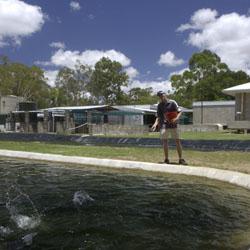Aquaculture Centre opens at CQU; Fish help plants grow
Published on 21 November, 2002
Central Queensland University researchers are closely studying the efficiencies of recycled water and the reuse of aquaculture waste products as nutrients for growing plants at the new Aquaculture Centre, which officially opened at CQU Rockhampton this week.
 The Centre currently raises several fish species, including barramundi, silver perch and red claw in its ponds. Researchers are using effluent from the fish to grow flowers, fruit and vegetables. The practical side of this procedure, according to researchers, is that farmers can add value to our produce.
The Centre currently raises several fish species, including barramundi, silver perch and red claw in its ponds. Researchers are using effluent from the fish to grow flowers, fruit and vegetables. The practical side of this procedure, according to researchers, is that farmers can add value to our produce.
The new water recycling facility is expected to reduce water requirements several times over.
Biological and Environmental Science lecturer Les Unwin said aquaculture, or fish-farming, is a booming global industry, however the discharge of effluent into the environment could dampen the industries prospects if left unchecked.
“By using the waste from the University’s aquaculture ponds we hope to develop methods for growing plants while reducing effluent problems, which are frequently associated with aquaculture,” Mr Unwin said.
“The CQU Aquaculture Centre provides a facility for research and teaching where we can complete trials and evaluate efficiencies which might be utilised in real situations.” Aquaculture is the fastest growing sector of the primary industry in Australia, with value of the industry more than doubling in Queensland over the past several years.
Since the mid 1970s, demand for fish has exceeded supply. The maximum sustainable yield of the wild fishery is over extended and aquaculture is filling the gap, complimenting the wild catch. Researcher Unwin believes that with this essential industry comes a growth in effluent. “We need to give some consideration to this effluent in a positive sense for the future.”

